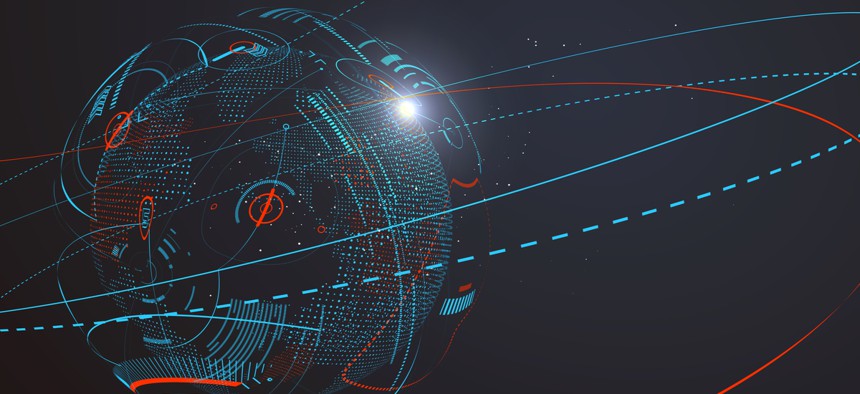Space Firms Put Aside Rivalries to Share Threat Data

Liu zishan/Shutterstock.com
A new clearinghouse has begun gathering and distributing information about threats to space networks, products, and services.
Two dozen space-related companies and organizations have overcome their rivalries to launch a clearinghouse for information about threats to their networks, products, and services.
The Space Information Sharing and Analysis Center, or ISAC, formally stood up in 2019, but began operation earlier this month amid what national security officials say are increasing threats to U.S. satellites and corporate computer networks from Chinese, Russian, and other foreign hackers.
“This capability will serve as the first of its kind, enabling commercial industry and international space partners to share timely, actionable information about space-based threats, Space ISAC officials said in a statement provided to Defense One.
It’s rare for companies to openly share information about threats to their products or corporate infrastructure as it can reveal vulnerabilities and hand competitors an advantage. The 24-member collaboration underscores the concern with the sector.
“As the battlespace shifts from the ground to space, the nation’s ability to stay ahead of emerging threats depends on the industry’s active sharing of threat information and actionable steps that protect our national security, customers, employees, and stakeholders,” David Weissmiller, director of space solutions for Parsons, one of the group’s members, said in an emailed statement. “The Space ISAC is critical to establishing the consortium mentality necessary for building the communication channel to share that timely information.”
Cyware Labs, a New York-based cybersecurity firm, hosts the Space ISAC portal and threat intelligence sharing platform where analysts from the member companies and groups can collaborate and share information.
“This platform provides real-time alerting to the operational space community by Identifying mission impact, threat trending, operational hazards, and mitigation strategies against the threats,” Weissmiller said. “Our [initial operational capability] declaration allows us to receive threat intel from government and commercial entities, provides an increased value to our ISAC member base and supports the threat characterization for the entire space ecosystem.”
The idea for the consortium was born out of a Science & Technology Partnership Forum concept shared with companies and other space stakeholders at the 2018 Space Symposium, an annual gathering of thousands of space professionals in Colorado. Later that year, the Trump administration released a National Cyber Strategy calling to “enhance efforts to protect our space assets and support infrastructure from evolving cyber threats, and we will work with industry and international partners to strengthen the cyber resilience of existing and future space systems.” The strategy referenced the “the growing cyber-related threats to space assets and supporting infrastructure.” U.S. satellites are not only critical to military communications, intelligence and navigations, but they’re also the backbone for global finance.
“The Space ISAC’s IOC is recognition of the critical role our space infrastructure plays in our country’s national and economic security, a role that will grow dramatically in the near future,” said Samuel Visner, a technical fellow at MITRE who is a Space ISAC founding board member.






